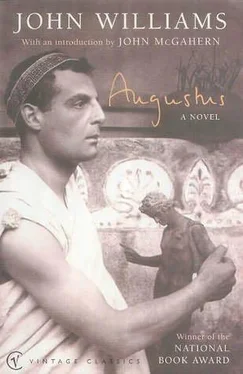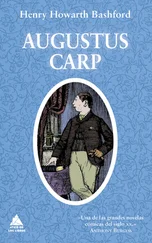John Williams - Augustus
Здесь есть возможность читать онлайн «John Williams - Augustus» весь текст электронной книги совершенно бесплатно (целиком полную версию без сокращений). В некоторых случаях можно слушать аудио, скачать через торрент в формате fb2 и присутствует краткое содержание. Жанр: Историческая проза, на английском языке. Описание произведения, (предисловие) а так же отзывы посетителей доступны на портале библиотеки ЛибКат.
- Название:Augustus
- Автор:
- Жанр:
- Год:неизвестен
- ISBN:нет данных
- Рейтинг книги:3 / 5. Голосов: 1
-
Избранное:Добавить в избранное
- Отзывы:
-
Ваша оценка:
- 60
- 1
- 2
- 3
- 4
- 5
Augustus: краткое содержание, описание и аннотация
Предлагаем к чтению аннотацию, описание, краткое содержание или предисловие (зависит от того, что написал сам автор книги «Augustus»). Если вы не нашли необходимую информацию о книге — напишите в комментариях, мы постараемся отыскать её.
Augustus — читать онлайн бесплатно полную книгу (весь текст) целиком
Ниже представлен текст книги, разбитый по страницам. Система сохранения места последней прочитанной страницы, позволяет с удобством читать онлайн бесплатно книгу «Augustus», без необходимости каждый раз заново искать на чём Вы остановились. Поставьте закладку, и сможете в любой момент перейти на страницу, на которой закончили чтение.
Интервал:
Закладка:
Yet you, yourself, could not wish to have these laws enforced universally, with the rigor that law must be enforced. Such an enforcement would be disastrous to yourself, and to many of your most loyal friends. And though those who know your purpose understand that you intend to define a spirit and an ideal, the mass of your enemies will not understand this; and you may discover that your laws against adultery may be put to even more corrupt use than that which they were designed against.
For no law may adequately determine a spirit, nor fulfill a desire for virtue. That is the function of the poet or the philosopher, who may persuade because he has no power; the power you have (which, as I have said, you have used so wisely in the past) cannot legislate against the passions of the human heart, however disruptive to order those passions may be.
Nevertheless, I shall write the choral hymn for the celebration, and I shall take pride in the task. I share your concern and your hope, though I fear the means you have taken to fulfill them. I have been wrong in the past; I hope that I am wrong now.
XI. The Journal of Julia, Pandateria (A.D. 4)
In this island prison, my life over, I wonder without caring at things I might not have wondered at, had that life not come to an end.
Downstairs in her little bedroom, my mother is asleep; our servant does not stir; even the ocean, which usually whispers against the sand, is still. The midday sun burns upon the rocks, which absorb the heat and throw it back into the air, so that nothing-not even a vagrant gull-will move in its heaviness. It is a powerless world, and I wait in it.
It is odd to wait in a powerless world, where nothing matters. In the world from which I came, all was power; and everything mattered. One even loved for power; and the end of love became not its own joy, but the myriad joys of power.
I was married to Marcus Vipsanius Agrippa for nine years; and according to the world's understanding of such matters, I was a good wife. During his lifetime I gave four children into his hands, and gave one more after his death. They were all his children, and three of them-since they were male-might have mattered to the world. As it turned out, none of them did.
It was, I believe, the birth of my two sons, Gaius and Lucius, that gave me the first real taste of that most irresistible of all passions, the passion for power. For Gaius and Lucius were immediately adopted by my father, it being understood that in the event of his death, first my husband and then one or the other of my sons would succeed as Emperor and First Citizen of the Empire of Rome. At the age of twenty-one I discovered that I was, except for Livia herself, the most powerful woman in the world.
It is empty, the philosophers say; but they have not known power, as a eunuch has not known a woman, and thus can look upon her unmoved. In my life I could never understand my father not apprehending that joy of power by which I learned to live, and which made me happy with Marcus Agrippa, who (as Livia often said in her bitterness) might as well have been my father.
I have often wondered how I might have managed the power I had, had I not been a woman. It was the custom for even the most powerful of women, such as Livia, to efface themselves and to assume a docility that in many instances went against their natures. I knew early that such a course was not possible for me.
I remember once that my father upbraided me for speaking in what he thought to be an unwomanly and arrogant tone to one of his friends, and I replied that though he might forget that he was the Emperor, I would not forget that I was the Emperor's daughter. It was a retort that gathered some currency in Rome. My father seemed amused by it, for he repeated it often. I do not believe he understood what I meant.
I was the Emperor's daughter. I was wife to Marcus Agrippa, who was my father's friend; but before and after that, I was the Emperor's daughter. It was accepted by all that my duty was to Rome.
Yet there was a part of me which, as year followed year, I came to know with increasing intimacy; it was a part that refused that duty, knowing it was a duty without reward…
A moment ago I wrote of power, and of the joy of power. I think now of the devious ways in which a woman must discover power, exert it, and enjoy it. Unlike a man, she cannot seize it by force of strength or mind or desire; nor can she glory in it with a man's open pride, which is the reward and sustenance of power. She must contain within her such personages that will disguise her seizure and her glory. Thus I conceived within myself, and let forth upon the world, a series of personages that would deceive whoever might look too closely; the innocent girl who did not know the world, upon whom a doting father lavished a love he could not give elsewhere; the virtuous wife, whose only pleasure was in her duty toward her husband; the imperious young matron, whose whim became the public's wish; the idle scholar, who dreamed of a virtue beyond Roman duty, and fondly pretended that philosophy might be true; the woman who, late in life, discovered pleasure, and used men's bodies as if they were the luxurious ointments of the gods; and who herself at last was used, to the intensest pleasure she had ever known…
I was twenty-one years of age when my father decreed the centennial festival to commemorate the founding of Rome, and I had given birth to my second son. My father and my husband were the chief worshipers at the festival, and made many sacrifices to those gods whose descendants are said to have established our city. It fell to me and Livia to preside equally at the banquet of the hundred matrons; I sat on the throne of Diana, and Livia across from me on the throne of Juno; and we received the ritual worship. I saw the faces of the richest and most influential women in Rome look up at me; I knew that many of them were married to enemies of my father who would have murdered him, were they not afraid. They looked at me with that odd expression that goes with the recognition of power; it was not love, nor respect, nor hatred, nor even fear. It was something that I had not seen before, and I felt for a moment that I had just been born.
Within a few weeks after the festival, my husband was to travel upon a variety of missions to the East-to the provinces of Asia Minor; to Macedonia, where my own father had spent his boyhood; to Greece; to Pontus and Syria, and wherever necessity might take him. It was, of course, contrary to all custom that I should accompany him; and until the festival, it had not occurred to me that I might do so, in defiance of custom.
But I did accompany him, despite the anger and persuasions of my father. I remember that my father said: "No wife has ever followed a proconsul and his soldiers into foreign lands; that is a task for freedwomen and prostitutes."
And I replied: "I would know, then, if you prefer me to appear a prostitute before my husband, or be a prostitute in Rome."
I intended the remark flippantly, and my father received it so; but I remember that it occurred to me afterward that it might not have been a joke; and I wondered if I had not been more serious than I had thought. In any event, my father relented; I joined my husband's retinue, and for the first time in my life, with my children and my servants, I crossed the borders of my native land.
From Brindisi to Apollonia, we crossed that little stretch of sea where the Adriatic empties into the Mediterranean; landing at Apollonia, we visited the sites where my husband and my father had companioned when they were boys. It was an easy and pleasant time, but I was eager to go onward, to places more strange and untrodden by Roman feet. From Apollonia we traveled northward through Macedonia to the new territories of Moesia, as far as the River Danube; and I saw strange people, who upon the approach of our carriages and horses, dodged like animals back into the forest, and would not be enticed into the open; they spoke in strange tongues, and many were dressed in the furs of wild animals. And I saw the bleak lives of the soldiers who had the misfortune to be stationed at this outpost of the Empire. They seemed strangely contented, and my husband spoke to them as if theirs were the most natural way of life that he could imagine. I had difficulty remembering that much of his life had been spent thus, in the days before I was born.
Читать дальшеИнтервал:
Закладка:
Похожие книги на «Augustus»
Представляем Вашему вниманию похожие книги на «Augustus» списком для выбора. Мы отобрали схожую по названию и смыслу литературу в надежде предоставить читателям больше вариантов отыскать новые, интересные, ещё непрочитанные произведения.
Обсуждение, отзывы о книге «Augustus» и просто собственные мнения читателей. Оставьте ваши комментарии, напишите, что Вы думаете о произведении, его смысле или главных героях. Укажите что конкретно понравилось, а что нет, и почему Вы так считаете.











